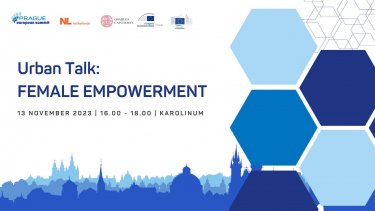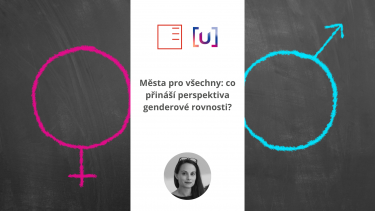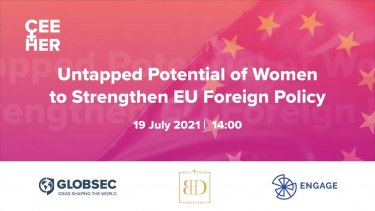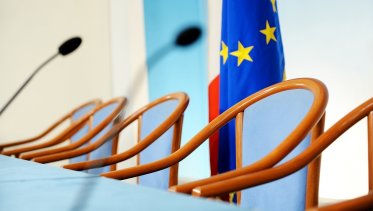BLOG | Gender quotas in business: the European Union and its strategy for equality
Even in the most developed countries in the world of today, there is still inequality between men and women, especially in the top public positions. One way of tackling this problem is gender quotas, which the European Union has now taken up in a business context. You can read about the adopted directive and the EU's overall strategy to address the under-representation of women in our intern Natálie Hendlingerová's new blog.
Show moreINVITATION | Urban Talk: Female Empowerment
We would like to invite you to a debate on "Female Empowerment" that is organized as a part of the Prague European Summit. The debate will take place on Monday, 13th of November 2023, from 16:00 in Karolinum.
Show morePOLICY PAPER | Shifting the gender quota debate from underrepresentation of women to overrepresentation of men within diplomacy
Ivana Uličná writes about the fact that even though some progress has been made towards gender equality in diplomacy, women remain underrepresented in ambassadorial positions worldwide. Quotas have been effective in boosting nominal representation of women but critiques focused on quotas being tokenistic and harming meritocracy place a double burden on women. However, even the current system is not meritocratic, as men benefit from a historical advantage and assumed competence, while women must justify their presence, prove their worth and disprove gender stereotypes.
Show moreURBACT: Cities for all: what does a gender perspective bring?
Our research associate Katarína Svitková wrote an article for URBACT. In the text, she outlines where gender is an issue in urban planning and management and how this perspective can help build better cities for life.
Show more
EU MONITOR: The European Union’s Position Toward Ukraine’s EU Membership
Jakub Ferenčík wrote the EU Monitor on "The EU's stance on Ukraine's EU membership", where he discusses Ukraine's potential membership in the EU. Ferenčík also discusses the process of transitioning to EU membership and compares it to a similar process faced by some other countries, notably Serbia. In his work, the author discusses some of the factors of the transition process, from subscribing to EU values such as "human dignity, freedom and equality" to creating an area of "prosperity and neighbourhood".
Show more

INVITATION: Untapped Potential of Women to Strengthen EU Foreign Policy
We would like to invite you to an event organized by the GLOBSEC think-tank, which our Research Fellow Danielle Piatkiewicz is a guest of. It will take place in English online on Monday, July 19 at 2 pm.
Show moreINVITATION: Café Evropa Online: Women in the 21st Century - Why do inequalities persist despite the "century of opportunities"?
We invite you to another debate within the Café Evropa format on Women in the 21st century - why do inequalities persist despite the "century of opportunities"? The debate is organized by the European Commission Representation in the Czech Republic and the EUROPEUM Institute for European Policy in cooperation with Eurocentrum Prague. The media partner of the debate is Deník.cz. The debate will take place online on March 8 on our Facebook.
Show more
INVITATION: Café Evropa: Women in the 21st century - how to face persistent inequalities?
EUROPEUM Institute for European Policy, in cooperation with the European Commission in the CR and the European Parliament Bureau, would like to invite you to another debate from the Café Evropa series, this time with the theme "Women in the 21st century - how to face persistent inequalities?".
Show moreINVITATION: The Value of Europe – What Do We Think about the Past, Present, and Future of Europe [MZV ČR]
We are happy to invite you to a presentation and follow-up round-table discussion co-hosted by EUROPEUM Institute for European Policy and Pew Research Center.
Show more PDFPOZVÁNKA: The Value of Europe – What Do We Think about the Past, Present, and Future of Europe [MZV ČR]
S radostí vás zveme na prezentaci a následnou diskuzi u kulatého stolu, kterou pořádáme spolu s Pew Research Center.
Show more PDFStaroměstské náměstí 4/1
Prague 1 - Staré Město
110 00
tel.: +420 212 246 552
email: europeum@europeum.org
https://www.europeum.org








